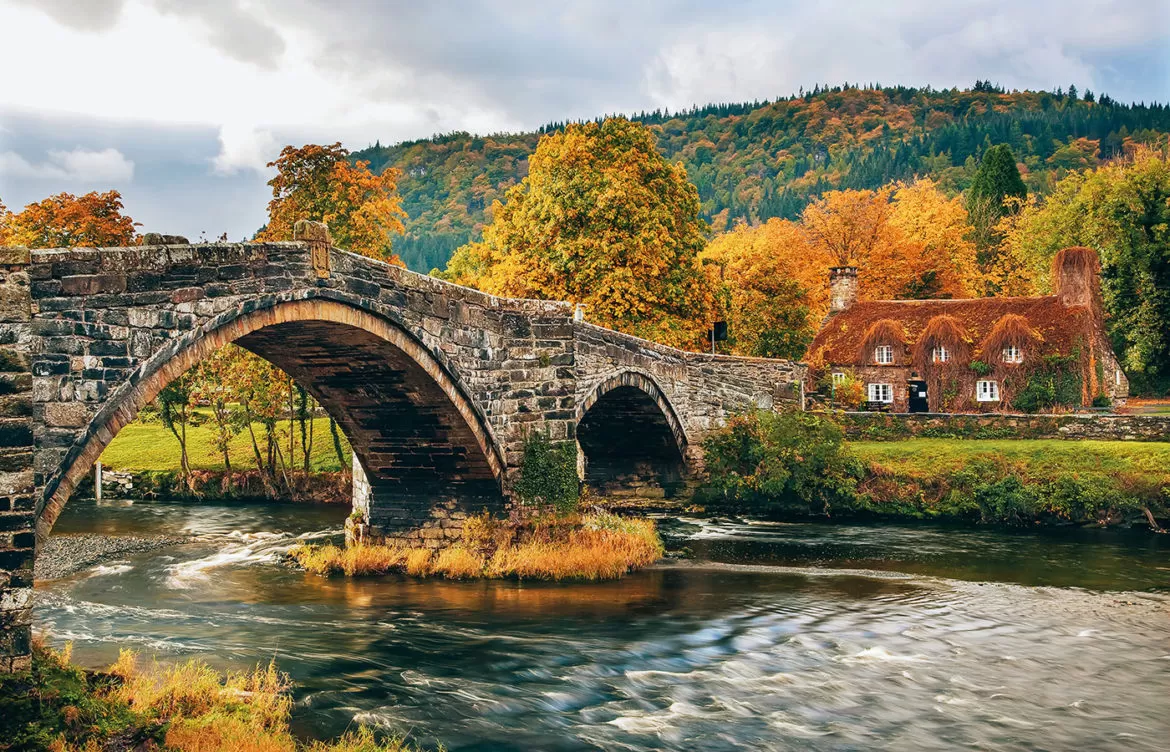Visiting Wales or buying a delicious Welsh cake? Then you need to learn these essential Welsh phrases for travel. Plus, you’ll learn how to pronounce the longest place name in Europe!
Can you pronounce Llanfairpwllgwyngyllgogerychwyrndrobwllllantysiliogogogoch? There are few you can. But after reading this Welsh phrase guide, you will! You don’t have to learn the entire Welsh language to be travel fluent. Just being able to understand and the most useful Welsh phrases and expressions will make all the difference when it comes to comprehension. This Welsh travel phrase guide will introduce you to the Welsh language with details about its origin, where it’s spoken, and more importantly, how to understand and speak Welsh.
Just like all my other travel phrase cheat-sheets, this guide is full of useful Welsh phrases and vocabulary which will help you better understand its speakers and have more meaningful conversations and interactions. To help me create this guide, I asked my friend and Welsh expert, Dr Gareth Popkins from How to Get Fluent to provide the translations to make the learning process easier. Plus, for each phrase, you can listen to the audio and hear how a native would pronounce it.
Dr Gareth Popkins helps people learn Welsh (and other languages including German and Russian) with this online language courses. An enthusiastic language learner, Dr Popkins began learning Welsh as an adult over 30 years ago and later lectured on Russian history through the medium of Welsh at Aberystwyth University. He has also trained to teach Welsh and English to adults. Check out Gareth’s German and Russian courses.
Let’s take a closer look at the Welsh language. Here’s what we’ll cover:
Table of Contents
- Where is Welsh spoken?
- A Quick History of Welsh
- How many people speak Welsh?
- Welsh Alphabet
- Varieties of Welsh
- Welsh Grammar
- Welsh Phrases for Travel
- Essential Welsh Phrases for Travel [Printable Infographic]
Where is Welsh spoken?
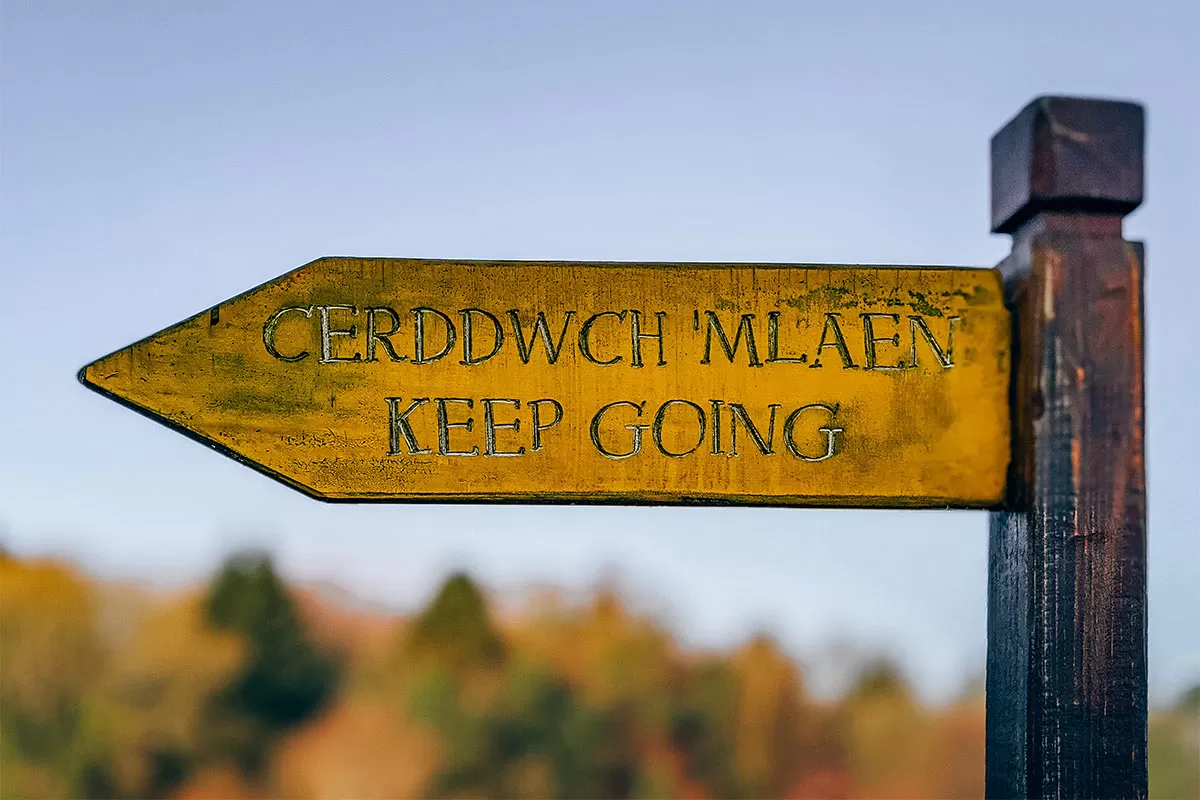 In 2020 the UK’s Office for National Statistics Annual Population Survey estimated that 866,200, or 28.6 per cent of the population of Wales aged 3 and over were able to speak the Welsh language (June 2020). There are fluent speakers throughout Wales and for most of them, Welsh is their first language. Apart from smaller children, all native speakers also speak English although many are more comfortable in Welsh.
In 2020 the UK’s Office for National Statistics Annual Population Survey estimated that 866,200, or 28.6 per cent of the population of Wales aged 3 and over were able to speak the Welsh language (June 2020). There are fluent speakers throughout Wales and for most of them, Welsh is their first language. Apart from smaller children, all native speakers also speak English although many are more comfortable in Welsh.
The largest absolute numbers are in the south but the percentage of speakers is greatest in north-west Wales, where some towns and villages are still over 70% Welsh-speaking. Welsh is the medium of instruction in about a quarter of the schools in Wales with the language taught as a compulsory subject in the rest. English is the main language in Welsh universities and colleges but Welsh is also used as a medium of instruction and research.
How many people speak Welsh?
There are probably more than 100,000 Welsh speakers in England. There is also a community of up to 5,000 first language Welsh speakers in Patagonia, descended from settlers who moved there from the 1860s. There are also several thousand speakers in North America. Whenever there’s a major news event in some far-flung part of the world, it’s amazing how Welsh radio and TV manage to unearth an expat Welsh speaker or two for an interview.
A Quick History of Welsh
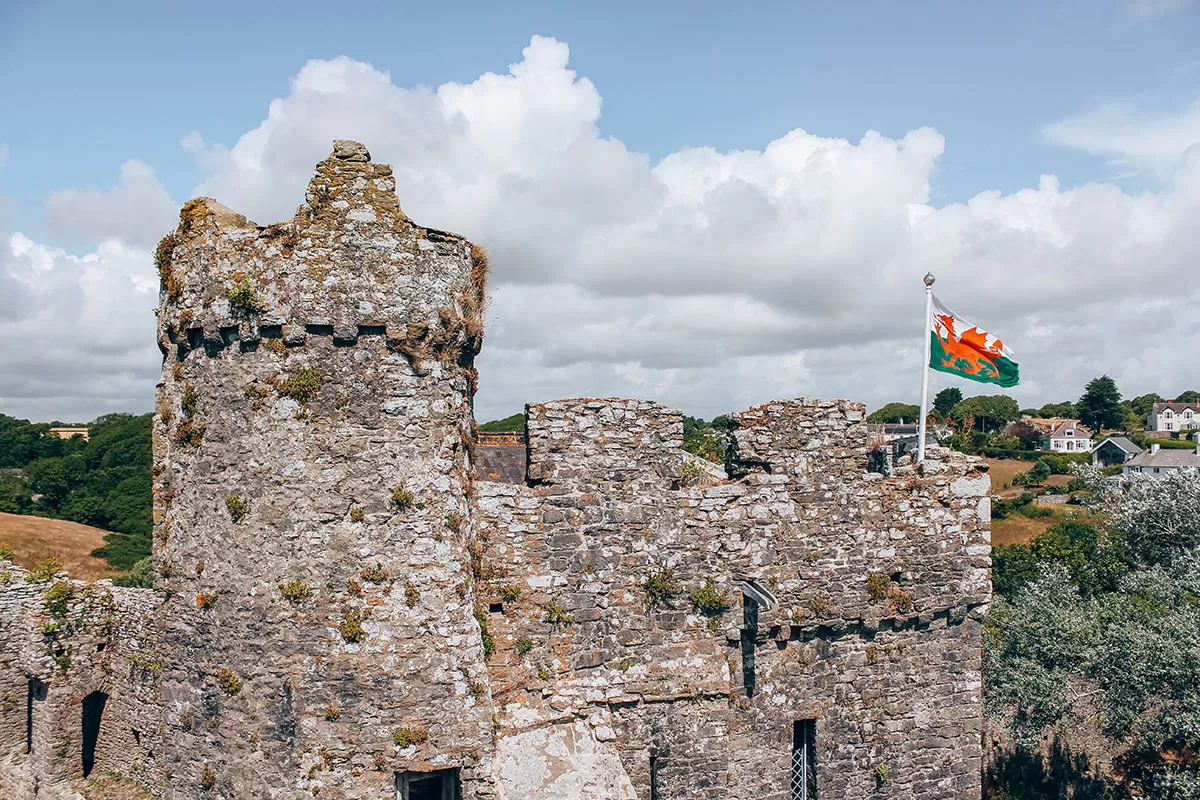 Old Welsh developed from Brythonic, the Celtic language that was spoken at the time of the Roman occupation (to the fifth century) throughout what are now England, Wales and the southern half of Scotland. The earliest Welsh poetry dates from the sixth century and actually comes from Strathclyde (southern Scotland). Old English gradually displaced Welsh in what became England but Welsh continued to develop as the main language of the independent Welsh kingdoms throughout the Middle Ages.
Old Welsh developed from Brythonic, the Celtic language that was spoken at the time of the Roman occupation (to the fifth century) throughout what are now England, Wales and the southern half of Scotland. The earliest Welsh poetry dates from the sixth century and actually comes from Strathclyde (southern Scotland). Old English gradually displaced Welsh in what became England but Welsh continued to develop as the main language of the independent Welsh kingdoms throughout the Middle Ages.
The kings of England gradually conquered Wales and in 1536 Henry VIII completed the process of its incorporation of Welsh into England. English became the only official language in Wales and this did not change in law until 1993. The upper layers of society become pretty thoroughly assimilated and gradually stopped using Welsh. This process continued into the middling groups, given a great boost by the prestige of British industrial and Imperial might and England’s relatively advanced, liberal political system which offered many people real chances to “get on”, provided they spoke English.
Until the late nineteenth century, though, Welsh remained the sole language of the vast majority of the Welsh population. At the end of the eighteenth century, Welsh-speaking Wales had the highest rate of popular literacy in the word. There was a vibrant traditional rural culture and a modern urban culture started to form as Wales was one of the heartlands of the industrial revolution. But by the last quarter of the nineteenth century, the vibrant economy was sucking in English and Irish workers in such numbers that they could no longer be assimilated. The introduction of compulsory mass education through English in the 1870s and the attractions of a new Anglo-American mass culture were great and more and more Welsh parents from among “the people”, shamed by their Welsh and seeing no economic advantage in it, often failed to pass the language on. By the 1930s only a third of the population spoke Welsh. From the 1970s to today further waves of English migration, this time into rural west Wales, have continued to shift the linguistic balance away from Welsh in the community.
In the mid-twentieth century, Welsh speakers started to campaign for more linguistic rights and an end to the historical marginalisation of the language in so many spheres of life. The battle has not yet been won but striking progress has been made in some areas of life, particularly in the visual sphere (more and more Welsh signs leading to fewer and fewer Welsh places).
Bilingual signage is now the norm in official life in Wales (road signs, names on government buildings) though not yet the private sector (in shops, product packaging and so on).
A significant minority of schools now teach through the medium of Welsh. Beneath a thin veneer of token Welshness, Welsh higher education is a bastion of Englishness but there’s been a bit of an increase in the use of the language as a medium of university research and instruction over the last decade.
The establishment of the National Assembly for Wales (now Senedd Cymru/the Welsh Parliament) in 1999 gave a boost to the profile and use of Welsh in government, the courts and in the economic sphere but it’s often just bolted on with varying enthusiasm and limited effect to core operations in English.
Overall, normalisation of the use of Welsh across the different domains of life compares favourably with what’s happening with Irish or the sorry state Breton by the French state. On the other hand, Wales’ achievements lag well behind what the Basques have managed to do with their language in Spain’s Baque Autonomous Region or what you’ll find in Iceland (Icelandic is a language with only a third as many speakers as Welsh but majority status and an unequivocal state machine behind it).
Welsh has been a written language with an amazingly rich written literary and musical tradition stretching back over 1500 hundred years. There have been many high points, including medieval poetry, the translation of the Bible into Welsh in 1588, popular rhymes and ballads throughout and, in the eighteenth and nineteenth centuries, yet more poetry and religious hymns of great richness. In the late nineteenth century a Welsh language press also developed but today there’s no daily newspaper in Welsh.
The BBC was resistant to the mainstreaming of Welsh and a Welsh radio station was not established until 1979 and it still doesn’t broadcast round the clock. After a long fight, a Welsh television channel was established in the 1980s. The quality of many programmes is excellent. Welsh has arrived online (including an impressive Welsh version of Wikipedia) and across social media with a vengeance.
Besides the great new friendships and connections that learning Welsh can bring, discovering the richness of Welsh culture is one of the great joys of learning the language. The National Eisteddfod is the best known annual Welsh-language cultural festival and the Urdd Eisteddfod is a similar event for children and young people. There are many opportunities to socialise through Welsh and get involved in sports and hobbies in Welsh.
Today there are a surprising number of novels written in the language and a rich tradition of theatre and great music of all genres from classical, through the famous Male Voice choirs, folk, pop and rock.
Adult Welsh learning is booming with many dedicated and innovative teachers and there are more and more resources available.
Welsh Alphabet
| Welsh Letter | Names of the Welsh letter |
|---|---|
| A | â |
| B | bî |
| C | èc |
| CH | èch |
| D | dî |
| DD | èdd |
| E | ê |
| F | èf |
| FF | èff |
| G | èg |
| NG | èng |
| H | âets |
| I | î or i-dot (ee dot) |
| J | je (as in jay) |
| L | êl |
| LL | èll |
| M | èm |
| N | èn |
| O | ô |
| P | pî |
| PH | ffî |
| R | èr |
| RH | rhî, rhô |
| S | ès |
| T | tî |
| TH | èth |
| U | i-bedol |
| W | (oo as in moo) |
| Y | (uh – a “shwa” sound, like the u in sun) |
Varieties of Welsh
Welsh has had a literary language since the Middle Ages and the translation of the Bible into Welsh further standardised the written language. More formal registers of modern written Welsh include some verb forms and other structures that are not typically used so much in the spoken language. These include a lot of contractions rather more extensive but of the same nature of English contractions from ‘I am’ to ‘I’m’, ‘It would’ to ‘It’d’ and so on.
If you’re learning Welsh, you’ll find that some courses are produced in a Southern Wales version and a Northern Wales version. This rather crude distinction at once exaggerates the regional differences and oversimplifies them. There’s a patchwork of local accents and vocabulary in the language and some grammar patterns are slightly different in different parts of Wales. Model your language on the speech of people you want to use the language with and, as you gain in confidence, you’ll have no problem understanding and being understood throughout the country.
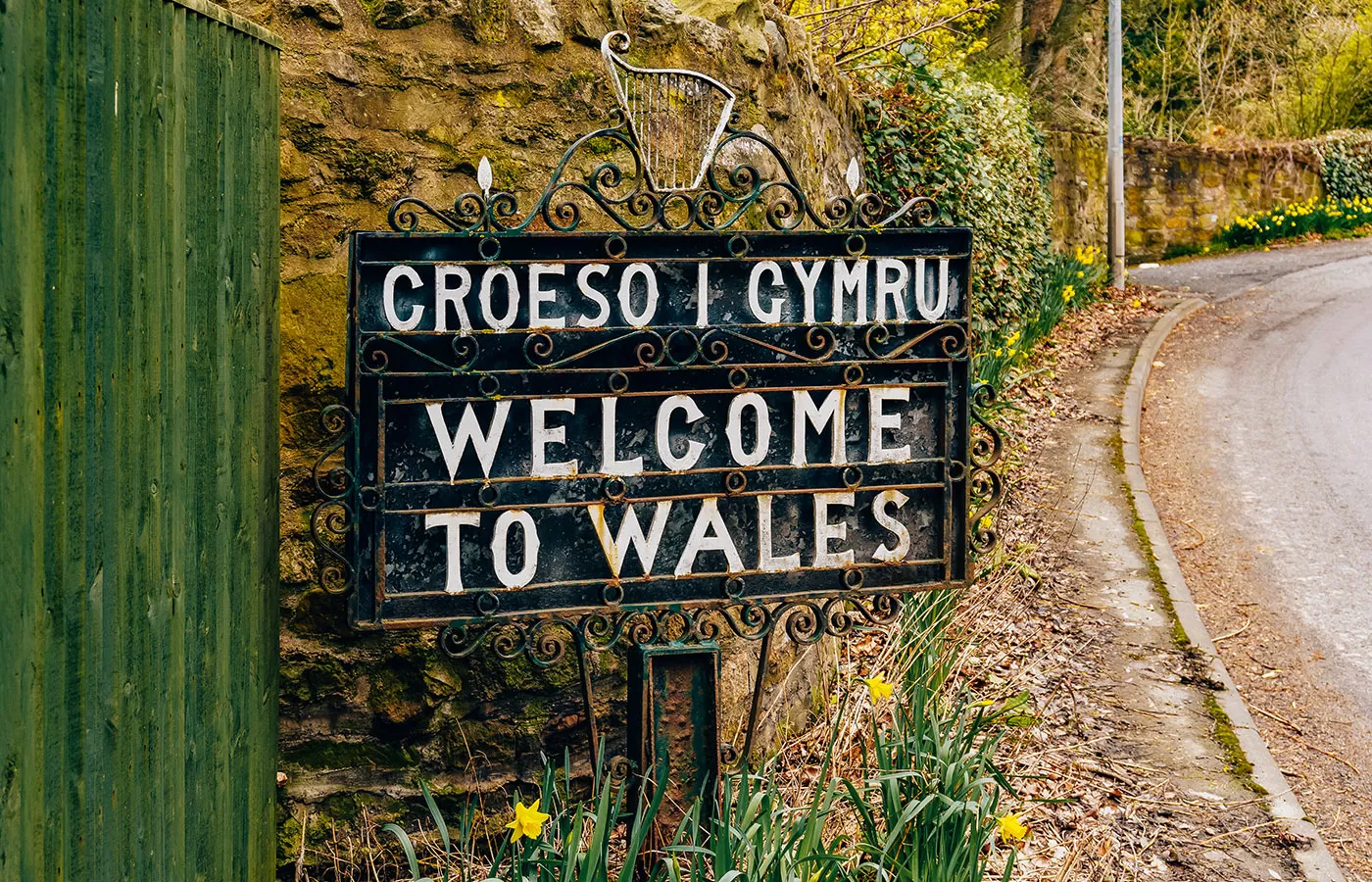
Welsh Pronunciation
Welsh contains two sounds not found in English: the [ch] rather like in German Bach or Scottish loch and the [ll] sound which sounds a bit like [thl] or the last syllable of the English word “kettle”. Welsh vowels are pure like in Italian or Spanish and can be either short or long. There are also vowel combinations (diphthongs) such as [aw] (rather like the “ou” in the English “found”) or [ei] (as in English eye). Only one isn’t found in English: [ew] as in mewn (in) – try saying meh-oon quickly.
Welsh stress is nearly always on the last syllable but one but there are occasional exceptions, such as Cymraeg (come-reyeg) (the word for the Welsh language itself)(the “eye” is pronounced rather like the English word “eye”).
Welsh spelling is very phonetic. Once you’ve learned some simple rules, you’ll be able to pronounce any word with confidence. Once you know how Welsh spelling works, you’ll no longer think that Welsh is jam-packed with consonants. [W] is used for the sound represented by [u] in English (short as in “cook” or long as in “move”) [y] represents the sound for which [i] is often used in English (short: sit, long: beat). Did you notice that there’s no letter [u] in “move” and no [i] in “beat”? What a pity English spelling isn’t as simple as Welsh!
Talking of consonants, [ff] is used like the [f] in English, and [f] like the English [v]. [Th] is pronounced the same as in English “thing”, while the other English [th] (as in “that”) is [dd] e.g bardd (poet). [Ch], [Dd], [Ff], [Ng], [Ph] and [Th] are considered to be letters in their own right. [Ng] comes after [g], so you’ll find trengi (to die) listed before treiddgar (penetrating) in a Welsh dictionary.
Welsh Grammar
English, like most European languages, has a basic Subject-Verb-Object (SVO) word order: the dog bit the boy. Welsh, like the other Celtic languages is a Verb–Subject–Object (VSO) (Brathodd y ci’r bachgen – Bit the dog the boy). Like French or Spanish, Welsh verbs have a range of endings to express tense (meaning the time when an action happened) and mood (indicative, imperative, subjunctive) but in speech, simpler forms are often preferred. Unlike French, Spanish, German or English, Welsh only has five basic irregular verbs, which are not difficult to learn.
Like French or Spanish, there are two genders: masculine and feminine. While Irish and Scottish Gaelic still have cases, these have long disappeared in Welsh. There’s not even the residual possessive case you find in English (eg. the boy’s dog). In Welsh, to show possession, you simply put the owner and the owned together: ci’r bachgen (literally, dog the boy).
While Germanic and Romance languages have endings, the Celtic languages have beginnings called mutations. However, in certain circumstances, the first consonant of a word will change (or even disappear). For example, after the definite article y (the), feminine nouns undergo the soft mutation, which affects four letters: [c] > [g]; [t] > [d]; [d] > [d]; [g] disappears cath > y gath; gardd > yr ardd (the [r] appears to aid pronunciation, rather as we say an apple not a apple in English).
There are two other types of mutation (nasal and aspirate). Don’t worry, you’ll get used to them with practice and you’ll usually be understood even if you don’t get them right. They’re easier to master than the case endings of German or the Slavic languages.
Want to have fun whilst learning Welsh? Struggling to find decent Welsh language resources? I recommend getting uTalk. Available as a desktop site and app, uTalk is awesome for learning key words and phrases, especially if you want to use it for travel purposes. It’s great for beginners getting started in a language and invaluable for intermediates looking to fill in gaps in their vocabulary and pronunciation.
What I love most about uTalk is that you can jump around their extensive library of topics and choose what you want to learn, when you want, and at your own pace. Because I believe in uTalk so much, I reached out to them and we’ve teamed up to offer you an exclusive 30% OFF reader discount across all of uTalk’s 140 languages! This offer isn’t available anywhere else! Click here to claim your exclusive 30% discount on Welsh.
Wales: Home to the longest place name in Europe
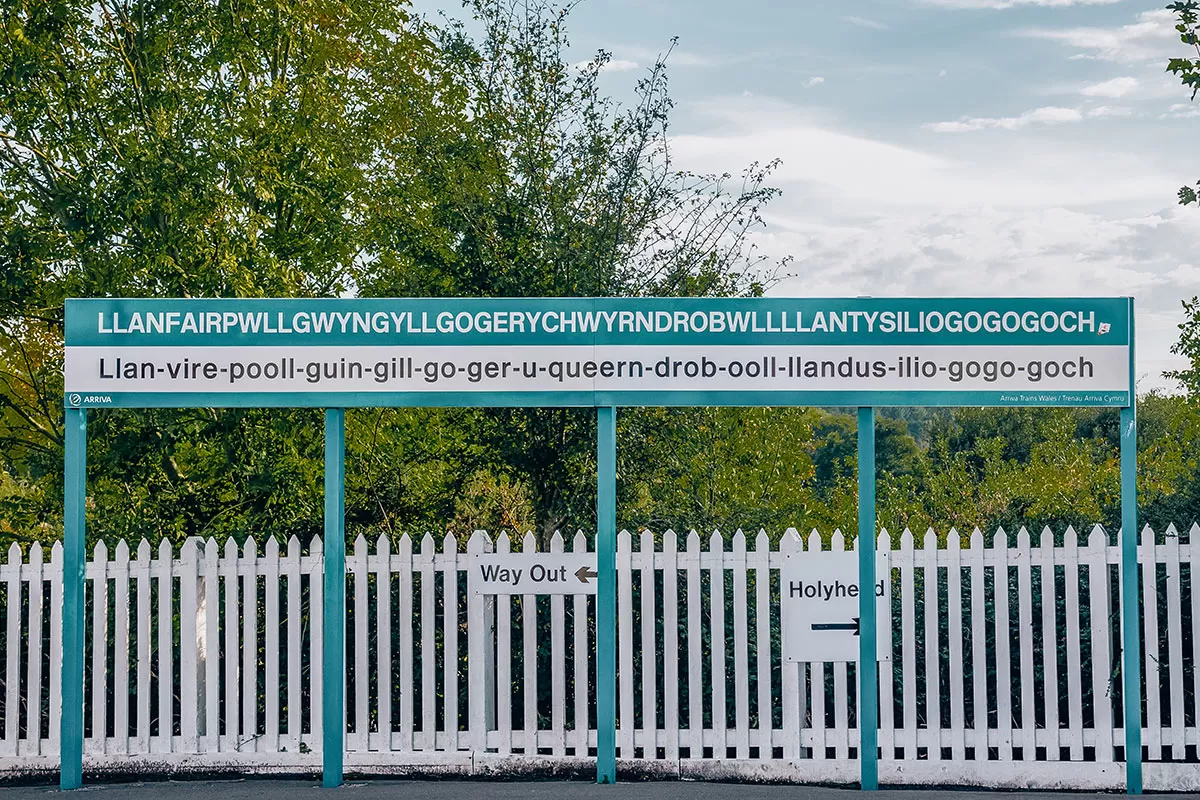 Fun Fact: Wales is famous for being the home to the longest place name in Europe! Located in a small, quiet town on the island of Anglesey off the northwest coast of North Wales is Llanfairpwllgwyngyllgogerychwyrndrobwllllantysiliogogogoch (llan-vire-pooll-gwin-gill-gore-ger-ih-queern-drorb-ooll-llandy-silio-gore-gore-goch), usually shortened to Llanfair-pwll or Llanfairpwllgwyngyll. This impressively long Welsh word translates roughly as “St Mary’s Church in the Hollow of the White Hazel near a Rapid Whirlpool and the Church of St. Tysilio near the Red Cave”. Although there are 58 characters, it is only considered to have 50 letters because in Welsh [ll], [ng] and [ch] are treated as single letters. Click the play button below to hear how it’s pronounced.
Fun Fact: Wales is famous for being the home to the longest place name in Europe! Located in a small, quiet town on the island of Anglesey off the northwest coast of North Wales is Llanfairpwllgwyngyllgogerychwyrndrobwllllantysiliogogogoch (llan-vire-pooll-gwin-gill-gore-ger-ih-queern-drorb-ooll-llandy-silio-gore-gore-goch), usually shortened to Llanfair-pwll or Llanfairpwllgwyngyll. This impressively long Welsh word translates roughly as “St Mary’s Church in the Hollow of the White Hazel near a Rapid Whirlpool and the Church of St. Tysilio near the Red Cave”. Although there are 58 characters, it is only considered to have 50 letters because in Welsh [ll], [ng] and [ch] are treated as single letters. Click the play button below to hear how it’s pronounced.
Now, let’s take a look at some essential Welsh phrases you should learn.
Welsh Phrases for Travel
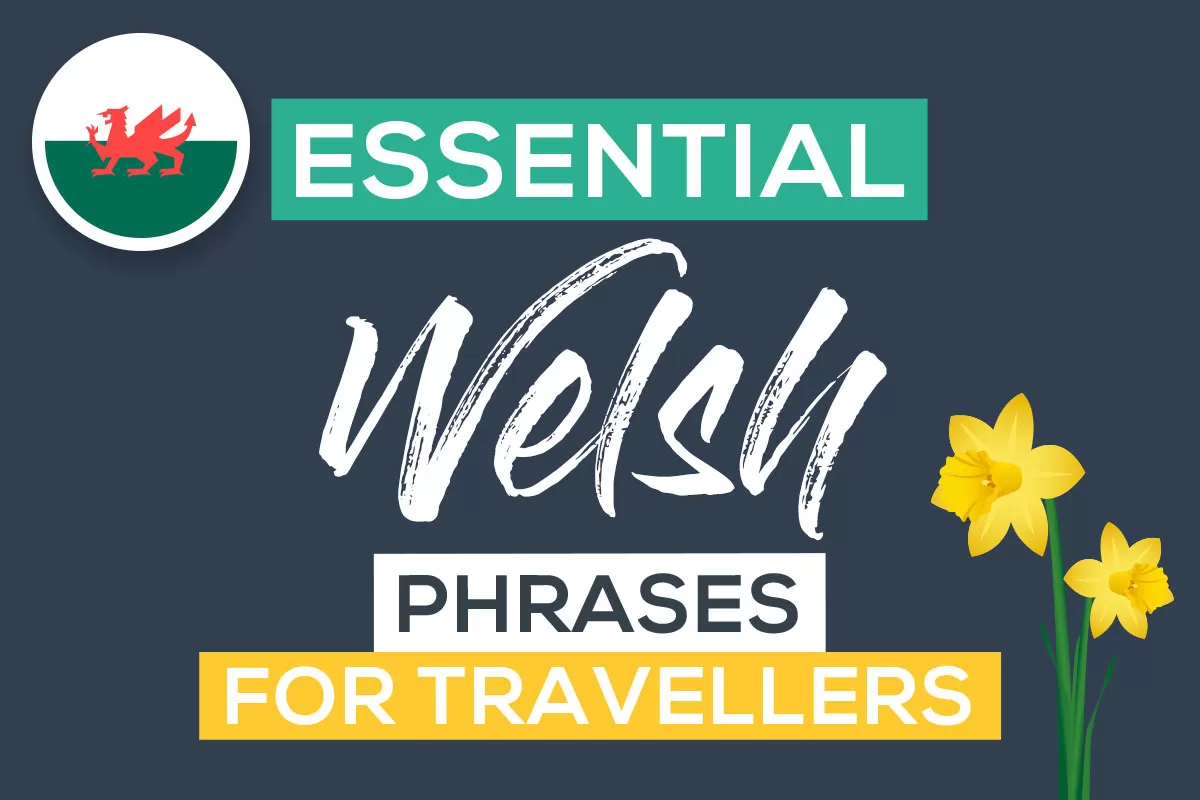 Want the infographic to take with you? Scroll to the bottom of the page.
Want the infographic to take with you? Scroll to the bottom of the page.
Common Welsh Greetings
| English | Welsh Translation |
|---|---|
| Hello (informal) | Shwmae? |
| Good morning | Bore da |
| Good afternoon | Prynhawn da |
| Good evening | Noswaith dda |
| Good night | Nos da |
| Goodbye | Da bo chi (formal); Hwyl fawr (informal); Tara (informal) |
| See you later | Gwela di wedyn (informal); Gwela chi wedyn (formal) |
| How are you? | S’mae? |
| Well / Very well | Iawn / Da iawn |
| So-so | weddol |
| Not bad | ddim yn ddrwg |
| I’m not well | dwi ddim yn iawn |
| Good, thank you, and you? (formal) | iawn, diolch, a chithau? |
| Good, thank you, and you? (informal) | iawn, diolch, a tithau? |
| What is your name? (formal) | Beth yw’ch enw chi? |
| What is your name? (informal) | Beth yw d’enw di? |
| My name is… | x dwi |
| Where are you from? (formal) | Un o ble dach chi?; Un o ble dych chi? |
| Where are you from? (informal) | Un o ble wyt ti? |
| I’m from… | Un o x dwi |
| I’m American I’m English I’m Australian I’m Canadian | Americanwr dwi (male); Americanes dwi (female); Sais dwi (male); Saesnes dwi (female); Un o Awstralia dwi (male or female); Un o Ganada dwi (male or female) |
| It’s nice to meet you | Mae’n braf cwrdd â ti (informal); Mae’n braf cwrdd â chi (formal) |
Greetings in Welsh Audio
How to be Polite – Cwrteisi
| English | Welsh Translation |
|---|---|
| Please (formal) | Os gwelwch yn dda |
| Please (informal) | Plîs / Os gweli di’n dda |
| Thank you | Diolch |
| Thank you very much | Diolch yn fawr |
| You’re welcome | Croeso |
| Yes | Ie |
| No | Nage |
| That’s fine / ok | Popeth yn iawn |
| Miss / young lady | Miss |
| Mrs / madam / ma’am | Mrs/Y Foneddiges |
| Mr. / Sir | Mr/Y Bonheddwr |
| Excuse me (to get attention) (informal) | Esgusoda fi |
| Excuse me (to get past someone ie. in a shop, on the bus) | Ga i heibio, os gwelwch yn dda |
| I’m sorry (eg. apologising for bumping into someone) | Mae’n ddrwg gen i |
| I’m very sorry (used when you regret something) (m/f) | Mae’n ddrwg iawn gen i |
| Excuse me, Miss / young lady | Esgusodwch fi, Miss |
| Excuse me, madam/ma’am | Esgusodwch fi, Madam |
| Excuse me, Sir | Esgusodwch fi, Syr |
| I don’t understand | Dwi ddim yn deall |
| Do you speak English? (formal) | Dych chi’n siarad Saesneg?; Dach chi’n siarad Saesneg? |
| Do you speak English? (informal) | Wyt ti’n siarad Saesneg? |
| I don’t speak Welsh | Dwi i ddim yn siarad Cymraeg |
| I only speak a little bit of Welsh | Dwi’n siarad dim ond tipyn bach o Gymraeg |
| Can you please repeat that slowly? (formal) | Wnewch chi ail adrodd yn fwy araf, os gwelwch yn dda |
| Can you please repeat that slowly? (informal) | Wnei di ail adrodd yn fwy araf, os gwelwch yn dda?; Wnei di ail adrodd yn fwy araf plîs? |
| Maybe | Efallai |
| I don’t know | Dwi i ddim yn gwybod |
| I don’t think so | Dwi ddim yn meddwl |
| Certainly! / Of course! | Yn bendant! / Wrth gwrs! |
| Cheers! (raising a toast) | Iehcyd da! |
Phrases for Being Polite in Welsh Audio
Questions – Cwestiynau
| English | Welsh Translation |
|---|---|
| Where are…? (people / places, locations) | Ble mae…. ? |
| Where? | Ble? |
| How? | Sut? Pa fodd? |
| How much? | Faint? |
| Who? | Pwy? |
| When? | Pryd? |
| Why? | Pam? |
| What? | Beth? |
| Which? | Pa…? |
| How much does this cost? | Faint ydy hyn yn costio? |
| Where is the toilet, please? | Ble mae’r ty bach os gwelwch yn dda? |
| May I have…? | Ga i….? |
| I would like… | Hoffwn i… |
| It’s… | Mae’n…. |
Phrases for Asking Questions in Welsh – Audio
Eating out and Ordering Food – Bwyta allan ac archebu bwyd
| English | Welsh Translation |
|---|---|
| Restaurant | Bwyty |
| Can you recommend a good restaurant? (formal) | Ydych chi’n gallu argymell bwyty da? |
| What would you like to order? (waiter asks the table) (formal) | Be’ hoffech chi? |
| How many are you? (waiter asks as you arrive) | Faint ohono chi sydd? |
| Breakfast | Brecwast |
| Lunch | Cinio |
| Dinner | Cinio / swper |
| Aperitif / Starter | Aperatif / starter / cwrs cyntaf |
| Entree / introductory course | Cwrs cyntaf |
| Main course | Prif gwrs / y brif saig |
| Salad | Salad |
| Dessert | Pwdin |
| Coffee | Coffi |
| What would you like to drink? | Be’ hoffech chi i’w yfed? |
| I would like another one, please. (i.e: the same thing again) | Hoffwn i un arall, os gwelwch yn dda |
| I like my steak rare / medium / well-done | Dwi’n hoffi fy stêc yn waedlyd; Dwi’n hoffi fy stêc yn ganolig; Dwi’n hoffi fy stêc wedi’i rostio’n dda |
| I would like…(used when ordering food) | Hoffwn i…. |
| The menu, please | Ga i’r fwydlen, os gwelwch chi’n dda? |
| Two beers, please | Dau gwrw, os gwelwch yn dda |
| A bottle of wine, please | Ga i botel o win, os gwelwch yn dda? |
| Red wine | Gwin coch |
| White wine | Gwin gwyn |
| A bottle of still water | Potel o ddŵr heb swigod; Potel o ddŵr amhefriog |
| A bottle of sparkling water | Potel o ddŵr gyda swigod; Potel o ddŵr pefriog |
| What do you recommend? (formal) | Be’ dych chi ‘n ei awgrymu? (Southern Wales); Be’ dach chi ‘n ei awgrymu? (Northern Wales) |
| What do you recommend? (informal) | Be’ ywt ti’n ei awgrymu? |
| Is the sauce spicy? | Ydy’r sôs yn sbeislyd? |
| I’m allergic to… (m/f) | Mae gen i alergedd i… |
| I’m a vegetarian (male) | Dwi’n llyseuwr |
| I’m a vegetarian (female) | Dwi’n llyseuwraig |
| The bill, please | Y bil, os gwelwch yn dda |
| Enjoy your food! | Mwynhewch eich bwyd! |
| It was delicious! | Roedd hi’n flasus iawn! |
Eating out and Ordering Food in Welsh Audio
Food and Ingredients – Bwyd a chynhwyson
| English | Welsh Translation |
|---|---|
| Tomato | Tomato |
| Garlic | Garlleg |
| Salt | Halen |
| Pepper | Pupur |
| Salad | Salad |
| Chocolate | Siocled |
| Bread | Bara |
| Chicken | Cyw iâr |
| Steak | Stêc / golwyth |
| Veal | Cig llo |
| Meat | Cig |
| Fish | Pysgod |
| Artichoke | Marchysgallen / artisiog |
| Pumpkin | Pwmpen |
| Leek | Cenhinen |
| Peas | Pys |
| Apple | Afal |
| Strawberry | Mefusen |
| Orange | Oren |
| Peach | Eirinen wlanog |
| Wine | Gwin |
| Water | Dwr |
| Juice | Sudd |
| Cheese | Caws |
| Lemon | Limon |
| Lime | Leim |
| Egg | Wy |
| Butter | Menyn |
| Sugar | Siwgar |
| Cawl | Cawl |
| Welsh rarebit | Caws pob |
| Laverbread | Bara lawr |
| Welsh cakes | Pice ar y maen (Southern Wales); Pice bach (Southern Wales); Cacen gri (Northern Wales); Teisen gri (Northern Wales) |
| Bara brith | Bara brith |
| Glamorgan sausage | Selsig Morgannwg |
Food and Ingredients in Welsh Audio
Getting Around – Teithio o gwmpas
| English | Welsh Translation |
|---|---|
| I’m lost (male) | Dwi ar goll |
| I’m lost (female) | Dwi ar goll |
| I would like to go to… | Hoffwn i fynd i… |
| How do I get to… | Sut mae cyrraedd… |
| Where is…? Where are…? | Ble mae…? |
| the bathroom | …’r ty bach |
| the train station | …’r orsaf drenau? |
| the shops | …’r siopau? |
| the restaurant | …’r bwyty? |
| the museum | …’r amgueddfa? |
| the post office | …swydda’r bost? |
| the market | …’r farchnad? |
| the pharmacy | …’r feryllfa? |
| the hospital | …’r ysbyty? |
| the bus stop | …’r safle bws? |
| the airport | …’r maes awyr? |
| the tourist information office | …’r ganolfan groeso? |
| the theatre | …’r theatr? |
| the park | …’r parc? |
| the city/town centre | …canol y ddinas / canol y dref? |
| the entrance | …’r mynedfa? |
| the exit | …’r allanfa / …’r ffordd allan? |
| the timetable | …’r amserlen? |
| the departure gate | …’r giât ymadael? |
| What time does it arrive there? | Am faint o’r gloch mae hi’n cyrraedd yno? |
| How long does it take to get there? | Faint o amser ydy hi’n cymryd i gyrraedd yno? |
| How much is the fare? | Faint yw pris y tocyn? |
| It costs… | Mae’n costio…. |
| the train | y trên |
| the flight | yr hediad |
| the baggage/luggage | y bagiau |
| I need a taxi | Mae angen tacsi arna i |
| Please stop here (to a taxi driver) | Arhoswch yma, os gwewch yn dda |
Phrases for Getting Around in Welsh Audio
Directions – Cyfeiriadau
| English | Welsh Translation |
|---|---|
| Turn… | Trowch… |
| Left | i’r chwith |
| Right | i’r dde |
| Straight ahead | Syth ymlaen |
| Towards… | I gyfeiriad… |
| It’s / It is… | Mae’n |
| It’s close by | Mae e gerllaw / Mae’n agos |
| Opposite | Cyferbyn â |
| Behind | Tu ôl i…. |
| Under | O dan… |
| In front of | O flaen… |
| Past | Heibio i… |
Asking for Directions in Welsh Audio
Sightseeing – Gweld golygfeydd/Ymweld
| English | Welsh Translation |
|---|---|
| I would like to buy | Hoffwn i brynu… |
| a ticket | …tocyn |
| two tickets | …dau docyn |
| two adult (fares) | …dau docyn oedolyn |
| one child (fare) | …tocyn plentyn |
| one student (fare) | …tocyn myfyriwr |
| one senior (fare) | …tocyn person wedi ymddeol |
Sightseeing phrases in Welsh Audio
Numbers – Rhifau
| English | Welsh Translation |
|---|---|
| 0 | dim |
| 1 | un |
| 2 | dau / dwy |
| 3 | tri / tair |
| 4 | pedwar / pedair |
| 5 | pump |
| 6 | chwech |
| 7 | saith |
| 8 | wyth |
| 9 | naw |
| 10 | deg |
| 11 | unarddeg |
| 12 | deuddeg |
| 13 | un deg tri / tri ar ddeg |
| 14 | un deg pedwar / pedwar ar ddeg |
| 15 | pymtheg |
| 16 | un deg chwech / un ar bymtheg |
| 17 | un deg saith / dau ar bymtheg |
| 18 | deunaw |
| 19 | un deg naw / pedwar ar bymtheg |
| 20 | dau ddeg / ugain |
| 30 | tri deg / deg ar ugain |
| 40 | pedwar deg / deugain |
| 50 | pum deg / hanner cant |
| 60 | chew deg / trigain |
| 70 | saith deg / deg ar drigain |
| 80 | wyth deg / pedwar ugain |
| 90 | naw deg / deg ar bedwar ugain |
| 100 | cant |
| 1000 | mil |
Numbers in Welsh Audio
Telling the time – Dweud faint yw hi o’r gloch
| English | Welsh Translation |
|---|---|
| Today | Heddiw |
| Tomorrow | Yfory |
| The day after tomorrow | Trennydd |
| Yesterday | Ddoe |
| Now | nawr (Southern Wales); rwan (Northern Wales) |
| Soon | yn fuan / cyn bo hir |
| Later | nes ymlaen |
| What time is it? | Faint o’r gloch ydy hi? |
| What time does it open? | Am faint o’r gloch ydy hi’n agor? |
| When does it close? | Am faint o’r gloch ydy hi’n cau? |
| in the morning | yn y bore |
| in the afternoon | yn y prynhawn |
| in the evening | gyda’r hwyr |
| It’s 1 o’clock | Mae hi’n un o’r gloch |
| It’s 10 o’clock (10) | Mae hi’n ddeg o’r gloch |
| It’s half past 8 (8:30) | Mae hi’n hanner awr wedi wyth |
| a minute | munud |
| an hour | awr |
Phrases for Telling the Time in Welsh Audio
Days of the week – Dyddiau’r wythnos
| English | Welsh Translation |
|---|---|
| Monday | Dydd Llun |
| Tuesday | Dydd Mawrth |
| Wednesday | Dydd Mercher |
| Thursday | Dydd Iau |
| Friday | Dydd Gwener |
| Saturday | Dydd Sadwrn |
| Sunday | Dydd Sul |
Days of the Week in Welsh Audio
Emergencies – Mewn argyfwng
| English | Welsh Translation |
|---|---|
| Help! | Helpwch fi! |
| I need a doctor | Mae angen meddyg arna fi |
| I feel ill | Dwi’n teimlo’n sâl / Dwi’n teimlo’n wael |
| I have pain here | Mae gen i boen yma |
| Call… | Galwch… |
| the police | …yr heddlu |
| an ambulance | …ambiwlans |
| the fire brigade | …y brigâd dân |
| There’s a fire! | Tân! |
| Watch out! | Gwyliwch! |
| Stop, thief! | Arhoswch, lleidr! |
| Go away! (formal or plural) | Ewch o’ ma! (Northern Wales); Cerwch o’ma! (Southern Wales) |
| Go away! (informal or 1 person) | Dos o’ ma! (Northern Wales); Cer o’ma! (Southern Wales) |
| There’s been an accident | Mae damwain wedi digwydd |
| Damage | Difrod |
| Pain | Gwayw / poen |
| I’ve been assaulted/attacked | Mae rhywun wedi ymosod arna i |
| I lost my passport | Dwi wedi colli fy mhasport |
| Where is the American/British/Australian/Canadian embassy? | Ble mae llysgenhadaeth yr UDA?; Ble mae llysgenhadaeth Prydain?; Ble mae llysgenhadaeth Awstralia?; Ble mae llysgenhadaeth Canada? |
| the Police station | Gorsaf yr heddlu |
Phrases for Emergencies in Welsh Audio
Shopping – Siopa
| English | Welsh Translation |
|---|---|
| Are you looking for something? (formal) | Ydych chi’n chwilio am rywbeth? |
| Are you looking for something? (informal) | Ywt ti’n chwilio am rywbeth? |
| Can I help you? (formal) | Ga i fod o gymorth? |
| Can I help you? (informal) | Ga i fod o gymorth? |
| May I just look? | Ga i ddim ond edrych? |
| I’m just browsing | Dim ond pori ydw i |
| That’s too expensive! | Mae hynna’n rhy ddrud |
| Can you give me a discount? | Ga i ostyngiad? |
| I’ll buy it! / I’ll take it! | Cymera i hyn! |
| Anything else? | Oes rywbeth arall? |
| That’s all, thank you / Nothing else, thank you. | Dyna ni, diolch yn fawr; Dim byd arall, diolch yn fawr |
| May I pay with credit card? | Ga i dalu gyda cerdyn credyd? (Southern Wales); Ga i dalu efo cerdyn credyd? (Northern Wales) |
| May I pay with cash? | Ga i dalu gyda arian parod? (Southern Wales) Ga i dalu efo arian parod? (Northen Wales) |
Phrases for Going Shopping in Welsh Audio
Expressions of Encouragement – Annog/cyffro/arswyd/parchedig ofn
| English | Welsh Translation |
|---|---|
| Congratulations! | Llongyfarchiadau! |
| Well done! | Da iawn! |
| You can do it! | Cei’i gwneud hi! (informal) / Cewch ei gwneud hi! |
| Wonderful! | Ardderchog! |
| Great! | Gwych! |
| Beautiful! | Hyfryd! |
| Fantastic! | Bendigedig! |
| Excellent! | Ardderchog! |
Expressions of encouragement in Welsh Audio
Welsh Phrases for Travel [Printable Guide]

Sources / A big thanks to Dr Gareth Popkins from How to Get Fluent. Check out Gareth’s German course and Russian Grammar course here.
Want to know more about learning languages? Start here!
- What Type of Language Learner Are You? Your 4-Step Personalised Learning Plan
- 18 Unexpected Advantages & Health Benefits of Learning A Foreign Language
- How to Learn Languages Like Crazy, Even If You Have a Crazy Life [3-Step Method]
- 10 Pro Tips: How to Learn a Language with a Full-Time Job
- 44 Best Movies on Disney Plus for Learning Languages
- 6 Language Learning Tips: How to Learn a Language from Home
- How to Learn Your First Foreign Language in 8 Simple Steps: A Beginner’s Guide
- Essential Travel Phrases: How to be Travel Fluent in 10 Simple Steps
- 7 Reasons Why You Should Go on a Language Holiday
- 20 Top Language Learning Resources You Should Use
- 13 Ways to Seamlessly Integrate Language Learning into Your Daily Life
- 23 Cool Gift for Language Learners They Will Actually Use and Love
- 11 Life-Changing Reasons Why You Should Learn a Language
- 42 beautiful Inspirational Quotes for Language Learners
- Language learning tips: 11 Polyglots Reveal The Secrets of Their Success
- Top 10 Best Ways to Learn a Language Better and Faster
- How to Learn Italian Before Your Trip
- Free Travel Phrase Guides
- How Many Languages are there in the World?
- Mondly Review: 10 Ways Mondly Drastically Improved My Language Learning
- 78 FREE Dictionaries to Learn a Language Fast [Free eBook Download]
- 22 KEY Travel Phrases That Will Transform Your Travels [Free Guide]
Like it? Pin it for later!
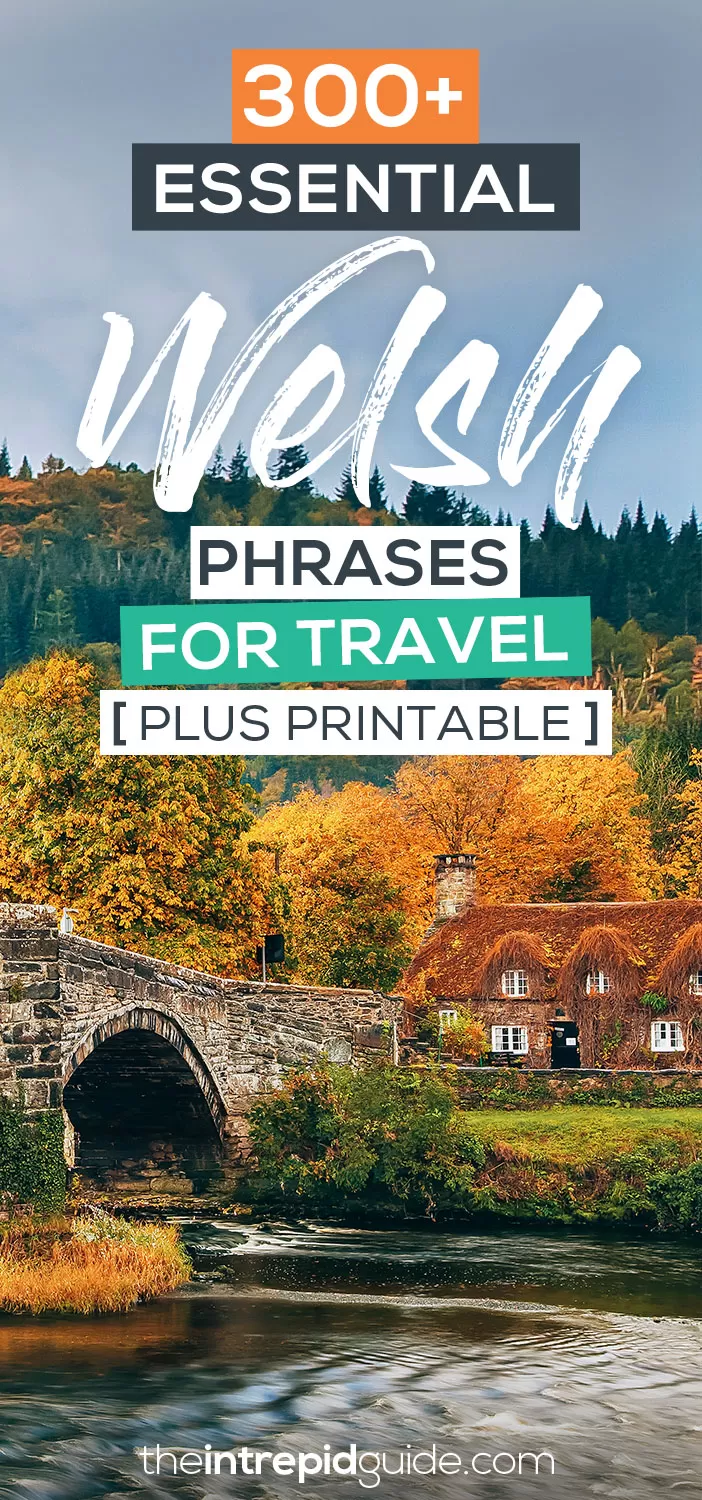
Over to you!
Which of these Welsh phrases did you find the most useful? Let me know in the comments section below or join me on social media to start a conversation.
Thanks for reading and I hope you enjoyed this post.
Like what you see? Subscribe using the form below to have all of my posts delivered directly to your email.

